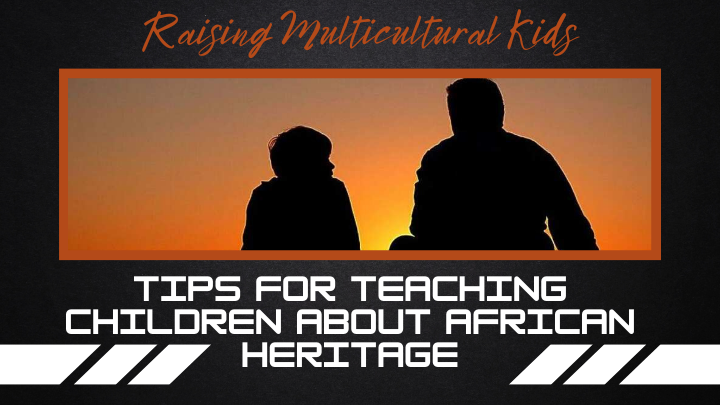Raising Multicultural Kids
In a world that is increasingly interconnected and diverse, raising multicultural children with a strong sense of pride in their heritage is more important than ever. For families with African roots, teaching children about their African heritage not only helps them develop a deeper connection to their roots but also fosters cultural appreciation in a multicultural environment. Whether living in a country far from the African continent or in an ethnically diverse neighborhood, it’s essential to provide children with the tools to celebrate and understand their African culture.
Here are practical tips for nurturing African pride and educating your children about their heritage:
1. Share Stories from African History and Tradition
One of the best ways to impart knowledge about African heritage is through storytelling. African cultures are rich in oral traditions, where folktales, proverbs, and historical stories were passed down from generation to generation. Share these stories with your children to help them understand the values, customs, and traditions of your culture.
Introduce them to famous African figures—like Nelson Mandela, Chinua Achebe, or Miriam Makeba—and discuss their contributions to society. By learning about these role models, children can take pride in their heritage and find inspiration in their stories. Look for books, documentaries, or even podcasts that provide a deeper understanding of African history, arts, and culture.
2. Celebrate African Holidays and Traditions
Engage your children in celebrating African holidays and cultural events, such as Kwanzaa, Africa Freedom Day, or festivals specific to your heritage. Participate in traditional dances, music, and food preparations. These celebrations are not only fun but also serve as a reminder of the importance of your African roots.
Teach your children about the significance of these holidays, helping them connect emotionally to the values and customs behind each celebration. This creates a deeper understanding of their identity and fosters a sense of belonging to a larger cultural community.
3. Incorporate African Language and Expressions
Learning an African language or even simple expressions can significantly enrich a child’s understanding of their heritage. If you speak an African language at home, encourage your children to use it regularly in daily conversations. If not, you can start by teaching them common phrases, greetings, and expressions used in your culture. Language is a powerful tool in connecting with one’s roots and can enhance your child’s sense of pride in their African identity.
Make language learning fun by playing games, listening to music, or watching films in your native language. This immersive approach can help children feel more comfortable and confident in speaking their mother tongue.
4. Expose Them to African Art, Music, and Fashion
Art, music, and fashion are integral to African cultures and provide a colorful window into the continent’s diversity. Expose your children to African music genres like Afrobeat, highlife, or traditional drumming. Let them listen to songs by famous African artists, attend cultural performances, or learn about the traditional dances from various regions.
African art is another powerful way to connect children with their heritage. Display African artwork in your home, visit museums with African collections, or even engage in crafting activities inspired by African art traditions. Additionally, introduce your children to African fashion by showcasing traditional attire or creating opportunities to wear clothing that reflects their heritage.
5. Build Relationships with Other Families in the African Community
Connecting with other families from the African diaspora or those with similar cultural backgrounds is an excellent way for children to see the value of their heritage. Attend cultural events, community gatherings, or social clubs to meet other families who share your background.
These relationships help children form a sense of community and foster friendships with others who are also navigating multicultural identities. They can learn from one another and find support in celebrating their African roots, making them feel proud of their heritage in a diverse world.
6. Encourage Curiosity and Open Conversations
Children are naturally curious, and fostering a space where they feel comfortable asking questions about their African heritage is crucial. Encourage them to ask questions and express any doubts they may have about their cultural identity. When your child comes home from school with questions about race, ethnicity, or culture, approach the conversation with patience and openness.
Use these conversations to explain the complexities of African culture, the diversity of the continent, and how important it is to embrace both African and global identities. By giving them a sense of pride and belonging, they will feel empowered to embrace who they are and how they fit into the world.
7. Travel or Learn About African Countries
If feasible, traveling to an African country or learning about the customs, landscapes, and people from different regions can provide children with a real-world connection to their heritage. If travel is not possible, consider taking virtual tours or exploring African countries through documentaries, books, or guest speakers from the African community.
This exposure broadens their understanding of the continent, its traditions, and its people, further reinforcing the beauty and importance of their African heritage.
8. Teach the Value of Cultural Pride
Cultural pride is an essential aspect of fostering a positive self-image. Teach your children to be proud of their African heritage and to respect other cultures. Emphasize the importance of understanding and appreciating the diversity that exists within their own cultural background.
Help them see that their African heritage is something to celebrate, not something to hide or downplay. By nurturing cultural pride, you’ll empower your children to navigate their identity confidently, both within their communities and on a global scale.
Raising children with a strong sense of pride in their African heritage requires intentionality, engagement, and love. By exposing them to African traditions, languages, and cultural practices, you can cultivate a deep sense of identity and pride. With these tools, your children will not only learn to honor their heritage but will also be equipped to celebrate the rich diversity of the world around them. Raising multicultural kids is about helping them feel grounded in who they are while embracing the diversity of their experiences.



